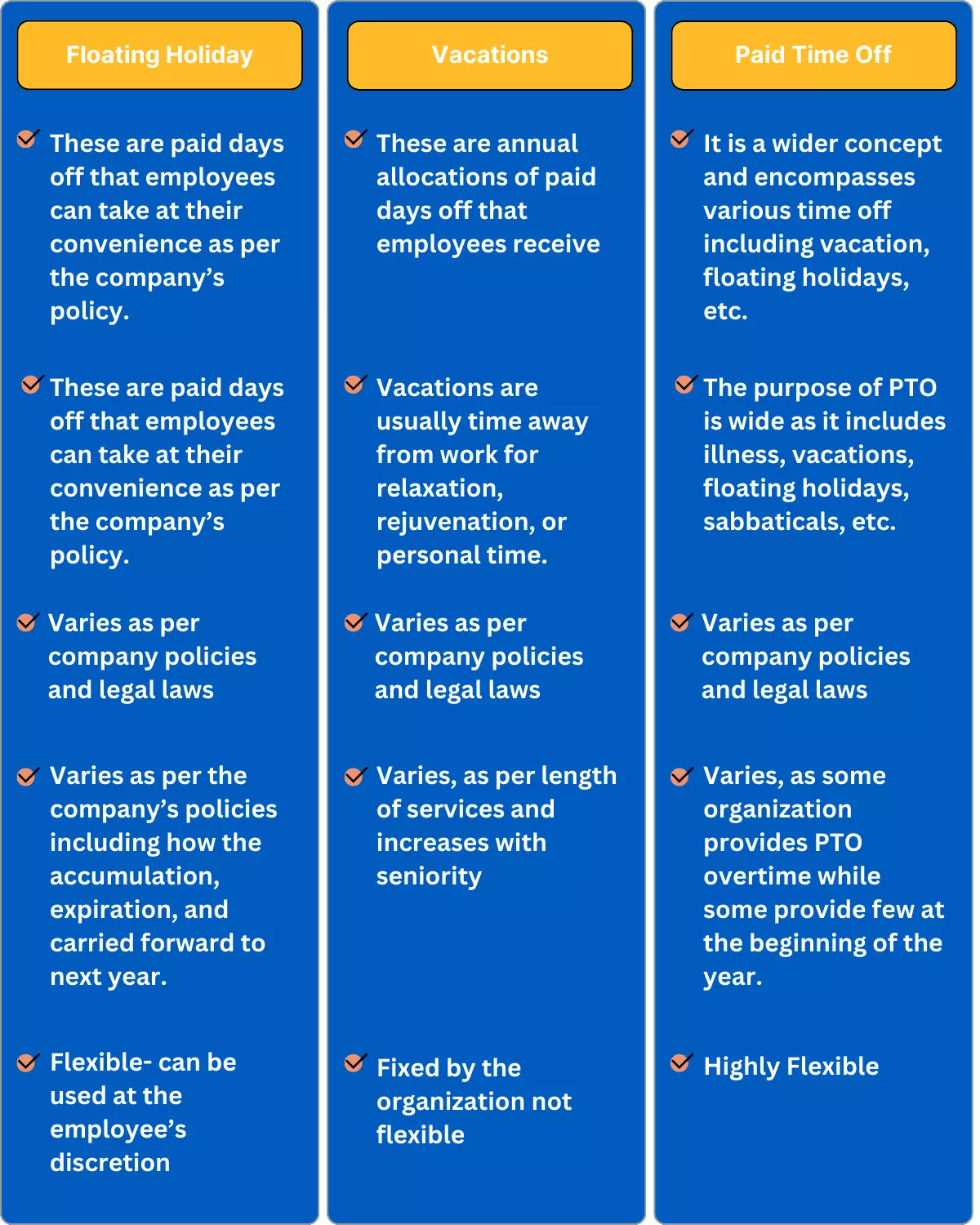What is a Floating Holiday?
A floating holiday is a personal time off that employees can take at any time required. The number of floating leaves an employee can take during a financial year depends on company policy and other central labour acts and compliances.
In a different way, public holidays that don’t land on the same day every year are also considered floating holidays. Floater leaves ensure flexibility in taking leaves, promote a healthy work-life balance, and boost company morale.
Purpose of Floating Holiday
Due to the floating holidays in organizations, employees can take leaves at their own pace, promoting a balanced work-life dynamic and thus leading to employee engagement and company productivity. In some companies, employees get religious holidays or other cultural time off as floating holidays, while employers consider birthdays or weddings as floating holidays in different organizations. The company manages the count of floating holidays using the leave management system and associated attendance-related tools.
Furthermore, some companies offer the flexibility to choose from various cultural, religious, and government holidays, accommodating diverse needs.
Can Floating Holidays be Paid?
Floating holidays can be paid or unpaid, depending solely on company policy. In some organizations, employees enjoy their birthday or anniversary or celebrate any special occasion as the floater leaves, which may be paid or unpaid. Yet, in some companies, public or regional holidays are considered floating or paid time off (PTO).
What Type of Policy is Applicable for Floating Holiday
Though every company has to maintain the national leave policies, every company has separate policies regarding floating holidays. Yet, some basic policies that every company should clarify during onboarding are,
- It is flexible throughout the year if there is any time to take a floating holiday.
- Is the floating holiday applicable only to permanent or temporary employees?
- Is the floating holiday applicable to employees on their probation period?
- How many number of floating holidays employee can take in a year?
- Is the floater leave applicable during the notice period?
- Whether the floating holidays be carried forward for the following year or not.
- Employees must contact HR if they require any other information about the floating holidays.
Benefit of Floating Holidays
Floating holidays, also known as personal or discretionary days, are additional paid days off that employees can use at their discretion. These days are not tied to a specific holiday or event but can be used for personal, cultural, or religious observances. They have impactful benefits for employers and employees in various ways, a few of which hold prominence, are as follows:
1. Enhances Retention
Floating holidays are a significant source of strengthening employees’ relationships with the organization. It enables employees of different religious or cultural horizons to take time off apart from their standardized leaves and stay available on local holidays or for any personal event.
It is a testament to an organization’s respect for its employees’ individual needs and preferences that they tend to stay rooted in the organization and continue with employment for a long time.
Furthermore, it is advantageous for employers to offer floating holidays to employees but with organized and planned policies to maintain equilibrium between the employees’ work and life so that no work gets hampered due to their absence and they enjoy their floating holiday without any interference from work.
2. Job Satisfaction
A floating holiday enhances employee requirements, needs, preferences, and pleasure, increasing job satisfaction.
Floating holidays can be used as a motivational factor to enhance employees’ concentration by allowing them extra paid time off from their regular hectic schedules and the standard holidays.
3. Work-Life Balance
A floating holiday significantly enhances employees’ work-life balance, giving them additional time off to avoid stress and burnout.
Work-life balance is essential to employees’ mental health, productivity, and advancements, as it directly affects the organization’s overall well-being.
In addition, offering floating holidays is also beneficial for enhancing the employees’ job satisfaction, as they feel valued and motivated to work and improve their efficiency, hence surging productivity. It also attracts and retains valuable employees by strengthening their connection with the company.
Also Read:
4. Religious Observances
Offering floating holidays can accommodate the religious observance of various festivals by employees from diverse backgrounds, cultures, and traditions.
An organization encompasses diversified employees possessing different beliefs, cultures, traditions, religions, and ethos. Hence, it is impractical for the organization to accommodate every festival and offer a paid day off for each one.
So, a floating holiday can be assigned to keep up with the employee’s motivation and respect for their traditions. Employees can choose their paid time off accordingly, and management should schedule and approve it.
5. Flexibility
The employee can choose a flexible floating holiday according to their preferences. Employees can use their holidays for personal, traditional, or cultural customs not part of the organization’s standardized holiday policy for the calendar year.
6. Reduce Absenteeism
Employees who get their preferred paid time off in addition to the standardized holiday tend to be less absent from regular working days.
Employees conveniently schedule floating holidays as per their requirements, substituting for public holidays. This motivates them to work better and be loyal to the organization, which makes them feel valued.
7. Attracts Talents
A floating holiday enhances job satisfaction among prevailing employees and the organization’s reputation among competitors in the cutthroat market. Hence, the organization’s goodwill attracts fresh and top talents. Besides, the company should include floating holidays as a benefit in the job description so that talents can’t be bounced back during onboarding. Moreover, it maintains transparency during employment.
8. Legal Compliance
The legal regulations of various countries vary according to the prevailing ruling parties and the constitution of the nation.
So, a floating holiday policy can help an organization comply with certain legal rules in certain countries. For example, in some jurisdictions, employers must provide a certain number of paid holidays annually. By offering floating holidays, which can be used for personal, cultural, or religious observances, employers can limit the number of holidays assigned to employees and avoid legal lawsuits.
9. Increases Productivity
A floating holiday policy helps to retain valuable employees and increases their efficiency, which results in job satisfaction.
Floating holidays are significant in maintaining work-life balance, which boosts employee morale to work efficiently and helps keep them from being exhausted from burnout and stress, ultimately elevating their productivity.
10. Robust Employee Connection
Employee connection in an organization is essential as it keeps employees rooted and helps attract and retain top talent.
Offering Floating holidays enhances employees’ relations with the organization. It makes employees feel valued and gives them flexibility in choosing their paid time off for personal, local, and religious observances.
11. Diversity and Inclusion
In a diversified workforce organization with employees from different geographical regions and different religious, cultural, and traditional beliefs, a floating holiday may be scheduled and approved to enhance inclusion in the workforce.
A diversified workforce is essential for your business’s progressive advancements, so the floating holiday policy must be framed accordingly to accommodate and benefit both employees and employers.
Difference Between Floating Holidays, Vacations, and PTO
FAQs on Floating Holiday
1. Is easter a Floating Holiday?
Yes, easter can be considered as a floating holiday.
2. Is labor day a Floating Holiday?
Yes, labor day can be considered as a floating holiday.
3. Can a Floating Holiday be carried over into the next year?
In general, floating holidays can’t be carried over into next year, though some companies allow them.
4. Are Floating Holidays and Optional Holidays the same?
Yes, floating holidays and optional holidays are the same thing. Both terms refer to paid time off. Employees can take leave any day they want, maintaining company policy in the case of floating holidays and optional holidays.


